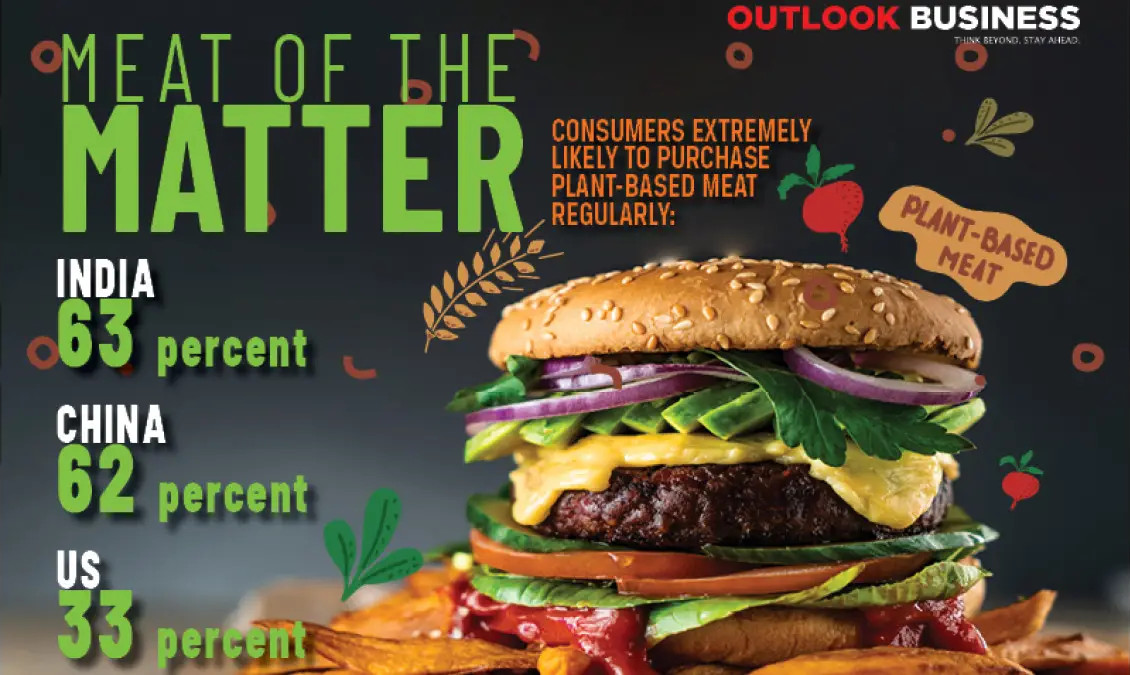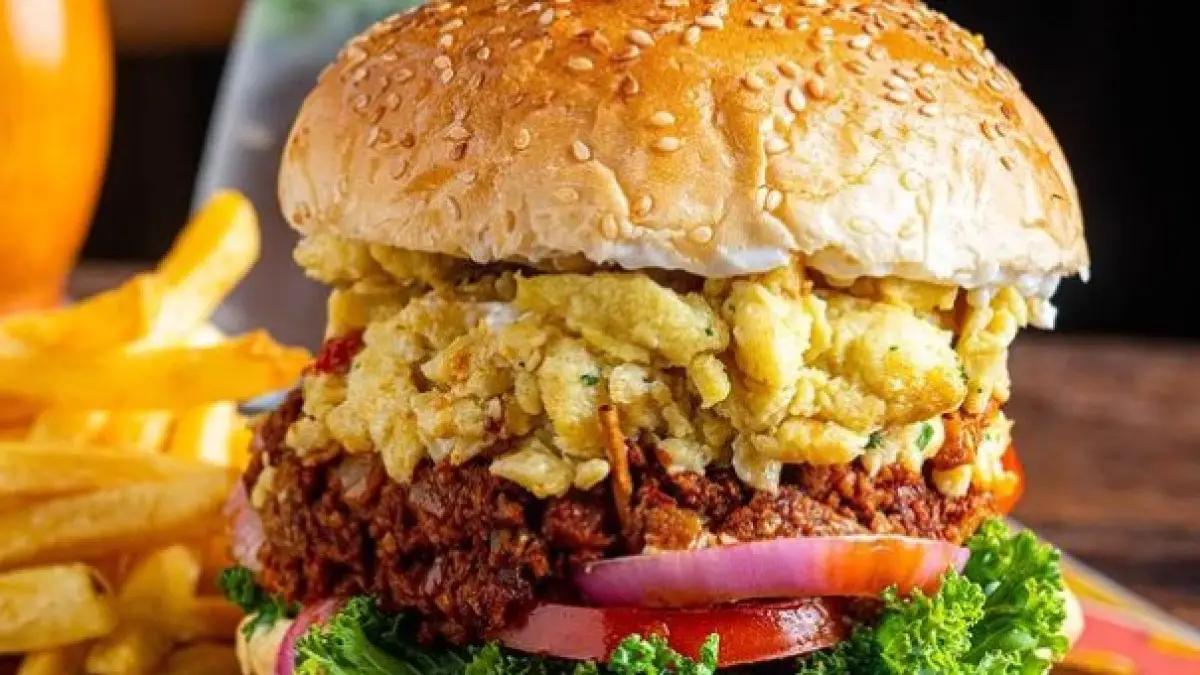To eat or not to eat—that is the question regarding plant-based mock meat for start-ups and consumers alike with concerns over health and other issues

It looks like an egg and feels like an egg. Ergo, it must be an egg, right? Wrong. EVO Foods, an alternate protein start-up based in India and the USA, recently launched a plant-based boiled egg, which can be grilled or fried like a chicken egg. Slap it between two burger buns with lettuce, tomato slices, melted cheese, mayonnaise, and voila, you have an egg burger that even staunch vegetarians can enjoy.
EVO is one of the many companies trying to carve a niche in the plant-based mock meat market. While large FMCG brands, like Tata Consumer Products and ITC Ltd, have recently forayed into this space, start-ups including GoodDot, Blue Tribe Foods, Wakao Foods, Imagine Meats and Shaka Harry, have already marked their territory.
These players have good reason to feast on the mock meat trend. According to a Research and Markets report, India's meat substitutes and mock meat market is estimated to reach over $47.57 million in value terms by the end of FY26, growing at a 7.48 per cent CAGR between FY21 and FY26.
According to the Good Food Institute (GFI) India, the country has seen several start-ups enter this space over the last two years, retailing their products in over 19 cities across India. But this kind of growth in a new space that deals directly with what people consume also comes with a number of caveats.

Growing awareness about how consumption of real meat leads to animal cruelty, detrimental impact on the environment and keenness to eat healthy have helped the trend flourish.
As per the GFI India’s research, the early adopters—the consumer cohort driving consumption in the nascent category—are 25-44-year-old educated omnivores and vegans in urban areas. This consumer segment has a higher intent to purchase plant-based meat regularly.
Seventy-three per cent indicated that they would be likely to do so and another 53 per cent indicated that they would be willing to pay a premium for plant-based meat over conventional meat.
While the perception is that this trend would be popular amongst the youth, Sairaj Dhond, founder and CEO of Wakao Foods, points out that it cuts across age and region.
"Due to rising awareness of the carbon emissions created by cattle and ethical concerns, cultured meat, also known as laboratory-produced meat, has just recently been added to the list of sustainable meat choices. Generation Z adults and millennial generation alike are favouring a plant-based diet," he states.
What is also helpinging consumers make this switch effortlessly is that mock meat substitutes are designed to equal animal alternatives in taste and texture. These go far beyond the conventional soya nuggets or soya chaap. The new generation of plant-based mock meats look, cook, smell and sizzle just like animal-derived meat, presenting consumers with the option of making a simple switch rather than a sacrifice.
Plant-based meat, eggs and dairy could be fortified with essential nutrients that conventional meat or dairy might not allow for, he adds.
This is where the discordance begins.

Several healthcare experts have cautioned against regular consumption of mock meat.
Rizwana Sayed, a registered dietitian and certified diabetes educator at Apollo Clinic in Pune’s Viman Nagar, acknowledges that while mock meat is healthier by itself, she would not consider it so when compared to the real deal. "The reason is the presence of many additives, flavouring agents, preservatives and sodium. Thereby, it is not recommended over real meat," she says.
Sayed insists that consuming mock meat regularly poses health issues like blood pressure, gastro and some instances of hormonal imbalances. "One has to be careful of how much they are eating, regarding the quantity and frequency; it should not be consumed on a regular basis," she states. Instead, she suggests that those comfortable eating real meat without medical issues like blood pressure, cholesterol or weight issues should continue but if anyone wants to switch to mock meat, they can switch to it to a certain extent.
Like Sayed, Dr. Girish SP, lead consultant-general and gastrointestinal surgery at Aster RV Hospital, also highlights that these alternatives often contain high amounts of salt and additives such as flavouring agents or preservatives. “Gluten-based mock meat may taste good but the hitch is that they come with zero nutritional value, digestive disorders, mood swings and reduced energy. Nutrients like iron, vitamin D and B12 are higher in real meat than in mock meat,” he states, which is another reason nutritionists vote for the real deal.
According to Dr Girish, research has shown that soy, used in mock meat, contains oestrogen-like compounds called genistein and daidzein. These are isoflavones believed to interfere with female sex hormones, causing breast cancer in women and also contributing to dysfunctions of thyroid hormone metabolism.
"Shockingly, some studies have reported that long-term consumption of the gluten-free diet may lead to a reduced level of fibre and minerals like iron, zinc and potassium in the body. Meanwhile, there is an increased risk of nutritional deficiencies such as B-complex vitamins and trace minerals considered as a major setback due to the impact of a gluten-free diet," he notes.
Arguing against the concerns aired by healthcare professionals, industry stakeholders point out that plant-based meat products can replicate and even improve the nutrition profile of meat, making them healthier and nutritionally complete.
Varun Deshpande, managing director, GFI India says that supplementing plant-based foods with micronutrients gives these foods a more complete, rounded nutritional profile. Since health is the critical reason consumers reach for these products, he also notes that brands are actively incorporating the 'health lens' into their product development strategies.
Abhishek Sinha, co-founder and CEO of GoodDot, mentions that animal meat has high amounts of cholesterol, zero dietary fibers and the presence of antibiotics and growth hormones, making them a healthier alternative to animal meat.
"Most mock meats are in ready-to-cook and -eat format, thus no additional salt needs to be added to them while cooking. Thus, comparing the sodium content with raw meat is incorrect. Rather, it should be compared with finished meat dishes. As for fats, mock meats generally have lower fat than red meat. In fact, the fat percentages vary with different products and companies. One of our offerings has almost zero fat," he emphasises.

Kartik Dixit, CEO and co-founder of EVO Foods, plays the devil's advocate in this debate. He agrees that initially, companies would focus on giving the right taste to consumers, which comes with a little compromise.
The ingredient list gets longer to achieve the texture, structure and cooking properties, thereby amounting to slight consumer mistrust. However, he notes that most ingredients used in creating plant-based meats are thoroughly studied in diverse literature and findings which present that using these in limited quantities does not damage the human body.
"Contrary to popular opinion, some artificial ingredients benefit human health! We have used a soluble corn-based fiber in EVO's boiled egg, which has a beneficial effect on blood lipids for weight management," he explains. At the same time, he concedes that companies should avoid controversial ingredients like erythrosine and propylene glycol.
Wakao’s Dhond admits that meat replacements, in contrast to dairy substitutes, are often unfortified and hence do not make up for the nutrients that come from animal products. The key, just like Sayed suggests, is moderation—something that the brands, too, try to advise their customer base.
"Proper dietary intake of any food is crucial. The body may experience negative impacts if such nutrients are consumed in excess or not at all. Not just faux meat or other highly processed foods but the naturally occurring foods should be ingested in the recommended amounts. The correct quantity would be what is needed to fulfill the recommended dietary allowance value," he reiterates.
Dhond says that one must be certain to consume a nutrient-dense diet that may include whole foods, legumes, vegetables, grains, nuts and seeds to compensate for the nutrients lost while consuming meat substitutes. “To make up for any protein lost when consuming imitation meat, be sure to eat foods high in protein such as tofu, lentils, chickpeas, etc.," he adds.

Since plant-based meat is a new sector, existing and potential customers have a plethora of questions.
Most want to know whether mock meats taste the same or better as compared to the real stuff, if the cost is the same or less than their animal-derived counterparts or if they are as easily available as conventional meat. Answering these questions effectively will define the success of the plant-based meat category in India and the start-up players actively engaged in it.
The price of mock meat can prove to be a deterrent in its widespread adoption. For instance, a 300g packet of Imagine Meats mutton mince costs Rs 395, while GoodDot's 220g pack costs Rs 305. In contrast, the average price of mutton mince in a local meat shop is around Rs 500 a kg. While keen to opt for healthier options, consumers will seek price parity while reaching out to that pack of mock meat product and making it a regular fixture in their pantry.
Deshpande notes that another area of inquiry is centred around how well plant-based meats can truly replicate conventional meat and how specifically to use these products. "Since many plant-based meats available in the market are often ready-to-eat or heat-and-eat products, questions continue to arise around how people can better incorporate these foods into their home cooking or daily consumption rather than thinking of these foods as snacks or treats for special occasions," he says.
The start-ups might also have to pay close attention to the question of availability and labelling as consumers interested in plant-based meats are often left wondering where specifically to buy these products from.
While modern trade in India has made it easier for consumers to access plant-based meats, they are still stumped about whether these would be available at the 'veg' or 'non-veg' frozen foods sections.
Even with platforms like Swiggy Instamart retailing these foods under the 'meat & eggs' category or Godrej Nature's Basket placing them under the 'Snack and Beverages' section, in keeping with global industry best practices, a large piece of work around consumer awareness remains to be carried out in India.
Companies, like GoodDot, are now trying to bridge this gap by providing information about their product's nutritional profile, ingredients and health benefits on their social media platforms. Of course, having brand ambassadors like Olympian Neeraj Chopra (GoodDot), cricketer Virat Kohli and actor Anushka Sharma (Blue Tribe Foods) and actor-couple Genelia and Riteish Deshmukh (Imagine Meats) does help in amplifying this messaging.
Ultimately, the proof of the pudding, or the mock meat in this case, remains in its eating. If the brands get that part along with the right pricing and stay true to their healthy eating ethos, they will find a growing number of takers for their products.
Housed under Ameyan Enterprises, Virgio is expected to be launched later this month. Virgio is a fast fashion platform with the target audience of Gen Z
As global VC biggies raise their biggest India-centric funds this year and visibly lose interest in China, India's start-ups are gearing up to grab the gain
The company raised $50 million in the Series D funding round in May this year, at a valuation of $500 million led by the Asia fund of L Catterton, along with A91 Partners, Elevation Capital, and...